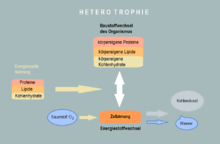Heterotrophy

Heterotrophy ( ancient Greek ἕτερος heteros “foreign”, “different” and τροφή trophé “nutrition”; thus “feeding on others”) describes in biology the building up of body parts ( anabolism ) by living beings from already existing organic compounds .
Animals , fungi and most bacteria and archaea have a heterotrophic diet. They use organic substances both as sources of energy by breaking them down chemically and to build up the body's own substances. You cannot create organic substances exclusively from inorganic substances. They are known as heterotrophs . They ecologically fulfill the function of the consumer , where they either eat herbivores , carnivores or omnivores . Some heterotrophs also fulfill the ecological function of destructors . Heterotrophic creatures have a species-specific food spectrum.
The ecological complement to heterotrophy is autotrophy , in which the carbon for the structure of organic substances is obtained exclusively from inorganic carbon compounds. This is particularly true of photosynthesis- performing primary producers (especially plants ), whose carbon source is carbon dioxide and whose energy source is light. There are individual species such as the flagellate Euglena and the so-called carnivorous plants , which both carry out photosynthesis and also absorb and use heterotrophic organic food.
Degree in socialization
Heterotrophy has led to different forms of coexistence between species of different organisms - with different degrees of mutual dependence:
- Commensalism : One of the two partners has clear advantages, but there are no disadvantages for the other.
- Mutualism : The partnership is beneficial for both partners such as B. in symbiosis .
-
Antagonism : The benefit lies exclusively with one of the two partners, the other is damaged to a greater or lesser extent, sometimes even fatally . A distinction is made between several categories:
- Predator-prey relationship : An animal predator (predator) feeds mainly on other animals (prey) that it hunts.
- Parasitism : In animals and plants, a host serves for nourishment for the parasite at least during a certain phase of its life. The consequences of parasitism are often illness or even the death of the host.
- Antibiosis : Substances are produced that restrict the growth or survival of parasites or competitors, e.g. B. Production of antibiotics by various fungi.
- Interspecific competition : There is competition for the same resources between individuals of different species or populations.
See also
literature
- Georg Fuchs, Thomas Eitinger, Hans Günter Schlegel: General microbiology. Georg Thieme, 2007. ISBN 9783134446081 . S158ff.
